Medical Disclaimer: This article is for informational purposes only and is not a substitute for professional veterinary advice. Always consult your veterinarian for any health concerns regarding camping with your dog.
Table of Contents
There’s nothing quite like sharing the great outdoors with your four-legged best friend. The thought of watching the sunset from a tent with your loyal companion by your side is what makes these adventures so special. But a successful trip involves more than just packing a leash. Proper planning for camping with your dog is essential to ensure your adventure is memorable for all the right reasons.
Key Takeaways
Before you start camping with your dog, a visit to your veterinarian is crucial. Ensure all vaccinations, flea, tick, and heartworm preventives are current. Not all dogs are suited for camping; consider your dog’s temperament, age, and physical health. Always pack a dog-specific first-aid kit, extra food, and plenty of fresh water. Research your destination to confirm it’s dog-friendly and understand the specific rules. At the campsite, keep your dog leashed or securely contained at all times to prevent wildlife encounters and ensure they don’t wander off. Finally, always perform a thorough tick check on your dog (and yourself) after your adventure.
Is Your Dog a Happy Camper? Assessing Suitability
From my years in clinical practice, I’ve seen that while many dogs are perfect candidates, not every pet is suited for the unique environment of camping with your dog. A successful trip begins with an honest assessment of your dog’s personality and physical condition.
Temperament and Training Considerations
A great companion for camping with your dog is typically well-socialized and not overly anxious in new environments. A dog that barks incessantly at every sound will not only have a stressful trip but will also disturb fellow campers.
Essential training commands include a reliable “recall” (come when called) and “leave it.” The outdoors is full of tempting and potentially dangerous items like discarded food, wild animal droppings, and toxic plants. A solid “leave it” can be a lifesaver.
Age and Health Factors
Your dog’s age and overall health play a significant role. Young puppies who haven’t completed their vaccination series are too vulnerable to infectious diseases and should stay home. Similarly, senior dogs with arthritis or other mobility issues may find the rugged terrain and sleeping on the ground uncomfortable. If your dog has a chronic health condition, such as heart disease or diabetes, discuss the feasibility of camping with your dog with your veterinarian first.
Before You Go: Essential Preparations for Camping with Your Dog
Proper preparation is the cornerstone of a safe and enjoyable camping trip with your canine friend.
Veterinary Check-Up and Vaccinations
Your first step should be a pre-trip wellness check with your veterinarian. This is the perfect time to ensure your dog is healthy enough for the adventure and to get up-to-date on all necessary vaccinations. Core vaccines are vital, but your vet might also recommend non-core vaccines, like one for Lyme disease, depending on your destination. This visit aligns with best practices for the routine health care of dogs to prevent illness.
Parasite Prevention: A Non-Negotiable
The great outdoors is also home to parasites like fleas, ticks, and mosquitoes that can transmit heartworm disease. As a veterinarian, I cannot stress this enough: ensure your dog is on a broad-spectrum parasite preventive. Following the comprehensive 2021 AAHA/CAPC Parasite Control Guidelines is the best way to protect your pet. Ticks are especially concerning in many Canadian camping areas. The Canadian Veterinary Medical Association warns that it’s tick season for much of the year, and these pests can carry diseases like Lyme disease, which has become more prevalent according to recent surveys of tick-borne pathogens in North American dogs.
Researching Dog-Friendly Campsites in Canada
Never assume a campsite allows pets. Always verify the rules before you book. Many national and provincial parks have specific regulations for pets. For instance, Parks Canada outlines rules for camping with pets, which often include keeping them on a leash and out of certain protected areas. Look for campsites that offer amenities that make camping with your dog easier, such as designated off-leash areas or nearby trails.
The Essential Packing List for Camping with Your Dog
You can visit: https://doglifeexpert.com/9-essential-dog-birthday-ideas-for-your-pup/
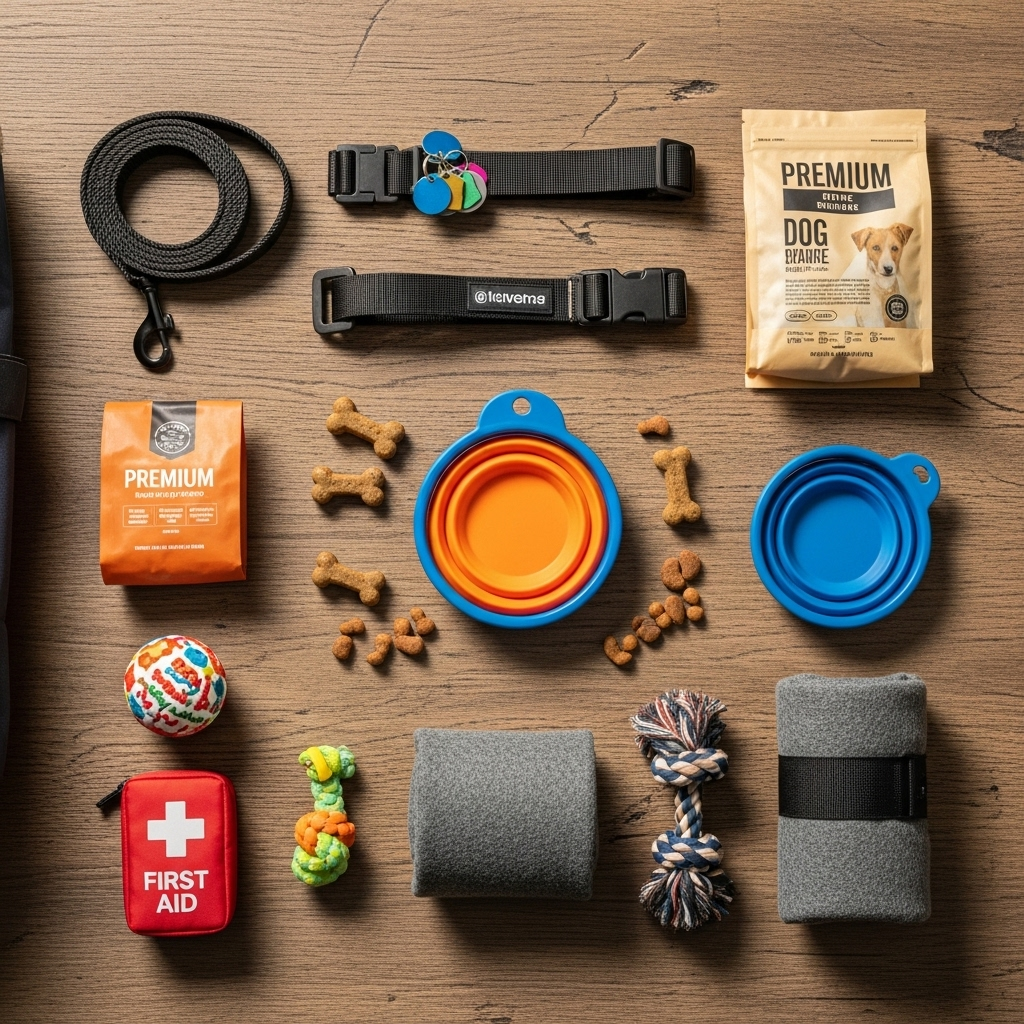
Forgetting a key item can turn a dream trip into a difficult situation. Use this checklist to pack everything your furry friend needs.
Identification and Safety Gear
- Collar with ID Tags: Ensure your contact information is current and legible.
- Leash and Long Line: A standard 6-foot leash for trails and a longer line for relaxing at the campsite.
- Harness: A well-fitting harness is often more comfortable and secure than a collar for hiking.
- Flashing Light or Reflective Collar: Crucial for visibility after dark.
Food, Water, and Feeding Supplies
- Dog Food: Pack more than you think you’ll need in a waterproof, animal-proof container.
- Fresh Water: Bring a dedicated supply of water for your dog. Do not let them drink from lakes or streams, which can contain parasites like Giardia.
- Collapsible Bowls: Lightweight and easy to pack for both food and water.
- Treats: High-value treats are great for rewarding good behaviour. Maintaining their regular feeding schedule while camping with your dog can help reduce stress and digestive upset.
Shelter and Comfort Items
- Dog Bed or Sleeping Bag: A familiar bed can help your dog settle in a new environment.
- Towels: For cleaning muddy paws or drying off a wet dog.
- Tie-Out Stake or Cable: To keep your dog safely contained at the campsite.
Canine First-Aid Kit Checklist
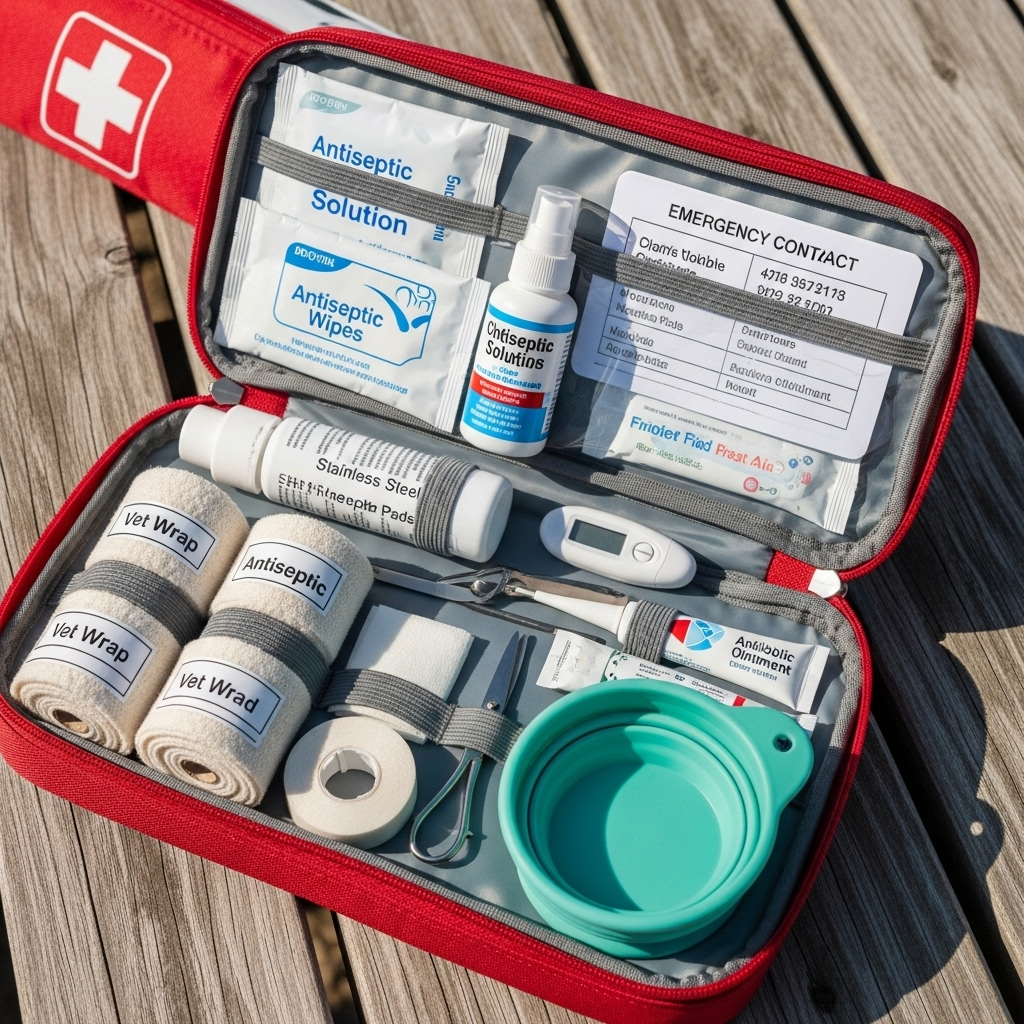
In my veterinary experience, a well-stocked first-aid kit is one of the most important pieces of gear when camping with your dog. You can buy a pre-made kit or build your own with these essentials:
- Gauze pads and adhesive tape
- Antiseptic wipes
- Saline solution (for flushing wounds or eyes)
- Tick remover tool
- Styptic powder (to stop minor bleeding)
- Benadryl (consult your vet for dosage)
- Your vet’s contact information
Campsite Safety and Etiquette
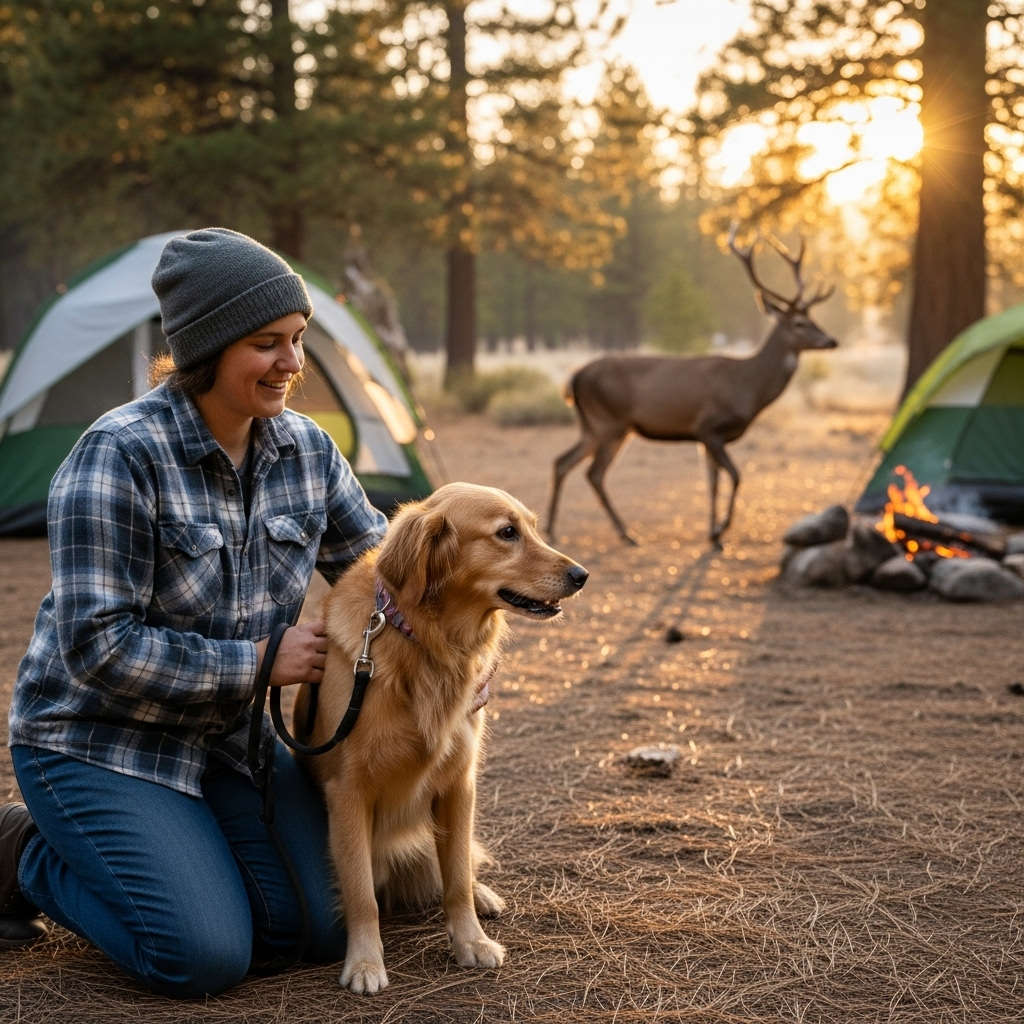
Once you arrive, maintaining a safe environment is key to a successful experience while camping with your dog.
Keeping Your Dog Secure
While camping with your dog, remember that even the most well-behaved pet can be spooked or tempted to wander off by a new sight or smell. Keep your dog leashed or on a tie-out at all times. This prevents them from getting lost, having negative interactions with wildlife, or bothering other campers.
Preventing Wildlife Encounters
Curiosity can be dangerous. Keep your dog away from wild animals, big or small. Skunks, porcupines, and raccoons can cause significant injury. Store your dog’s food securely, just as you would your own, to avoid attracting unwanted visitors to your campsite.
Campsite Dangers for Dogs
Be aware of your immediate surroundings. Before setting up, scan the area for broken glass, sharp rocks, or poisonous plants. The Merck Veterinary Manual provides a list of poisonous plants that can be found in the wild. Keep your dog away from the campfire and ensure any cooking grease is cleaned up promptly.
At-Home Checklist for a Safe Return
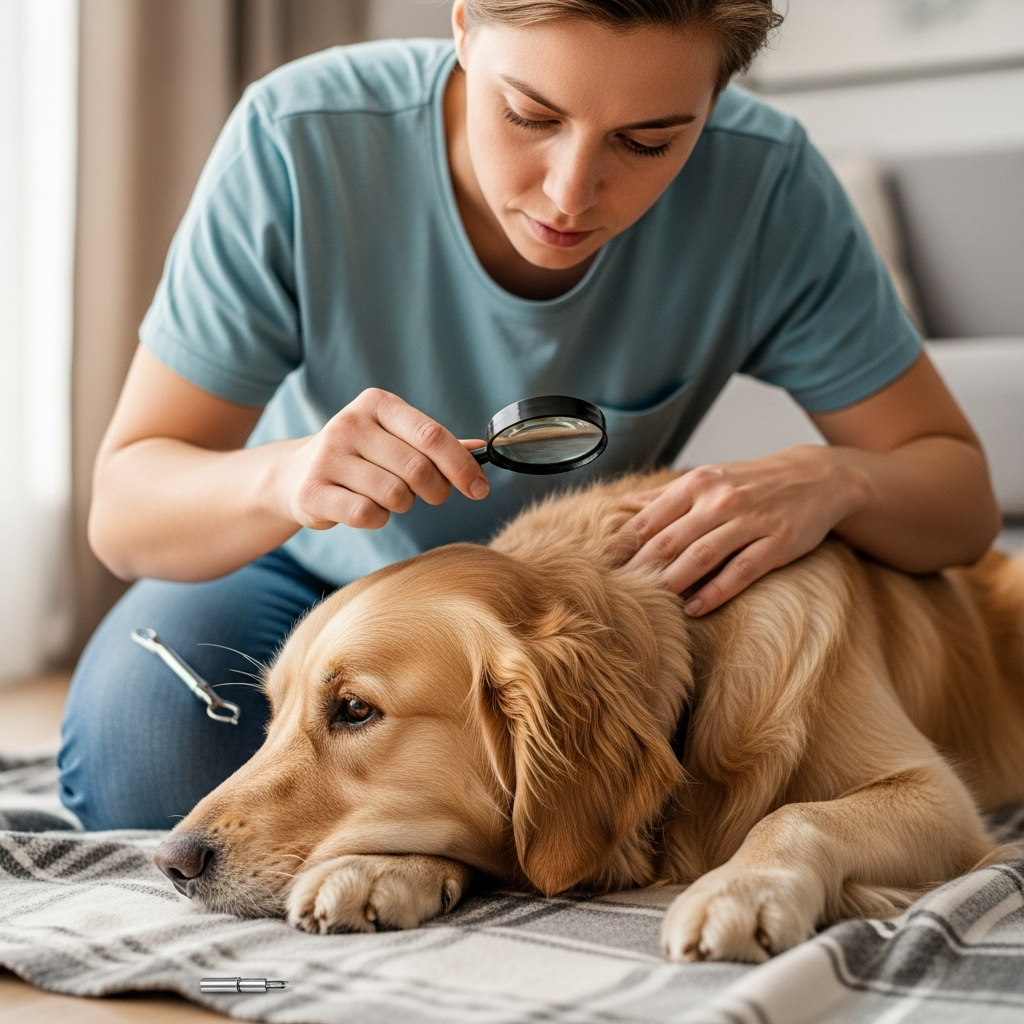
Your responsibility when camping with your dog isn’t over when you pack up the car. Follow these steps once you get home:
- Thorough Tick Check: Carefully run your hands over your dog’s entire body, checking for ticks. Pay close attention to the areas around the ears, between the toes, and under the collar.
- Inspect for Injuries: Look for any cuts, scrapes, or sore paws that may have occurred during your trip.
- Give a Good Bath: A bath can wash away any lingering dirt, allergens, or insects.
- Monitor Behaviour: For the next few days, watch for any signs of illness, such as lethargy, vomiting, or diarrhea. If you notice anything unusual, contact your veterinarian.
People Also Ask: FAQs About Camping with Your Dog

1. How do I keep my dog warm while camping?
Pack a dog-specific sleeping bag or insulated mat and warm blankets. A dog jacket can also be helpful for cold nights. Ensure your tent is well-insulated and free from drafts.
2. Can I leave my dog alone at the campsite?
No, it is never safe to leave your dog unattended at a campsite. A core rule of safe camping with your dog is constant supervision. They could get tangled in their leash, be targeted by wildlife, or suffer from heatstroke in a tent or car.
3. What should I do if my dog gets sprayed by a skunk?
The old tomato juice remedy is largely ineffective. It’s best to pack a commercial-grade skunk shampoo in your first-aid kit. If you don’t have any, a mixture of baking soda, hydrogen peroxide, and dish soap can work in a pinch.
4. How can I stop my dog from barking at the campsite?
Ensure your dog gets plenty of exercise during the day to tire them out. Bring familiar toys or a chew to keep them occupied. If your dog is prone to alert barking, choose a more secluded campsite if possible.
How We Researched This Article
To create this comprehensive guide on camping with your dog, we consulted leading veterinary resources and guidelines. Our research included reviewing the Merck Veterinary Manual for health and safety protocols, the American Animal Hospital Association (AAHA) for parasite control standards, and the Canadian Veterinary Medical Association (CVMA) for region-specific advice. We also incorporated information from Parks Canada and peer-reviewed scientific journals to provide the most accurate and helpful content for pet owners.
A Shared Adventure Awaits
The bond you share with your dog is forged in the everyday moments, but it’s deepened by the extraordinary adventures you share. Camping with your dog offers a unique opportunity to explore, play, and rest together, far from the distractions of daily life. With careful preparation and a focus on safety, your next camping trip can be a source of incredible memories that you and your loyal companion will cherish for years to come.
Dr. Asmat, DVM
Dr. Asmat is a small-animal veterinarian with over five years of clinical experience. She is passionate about empowering pet owners with the knowledge they need to provide the best possible care for their furry family members. Her professional credentials can be reviewed upon request.

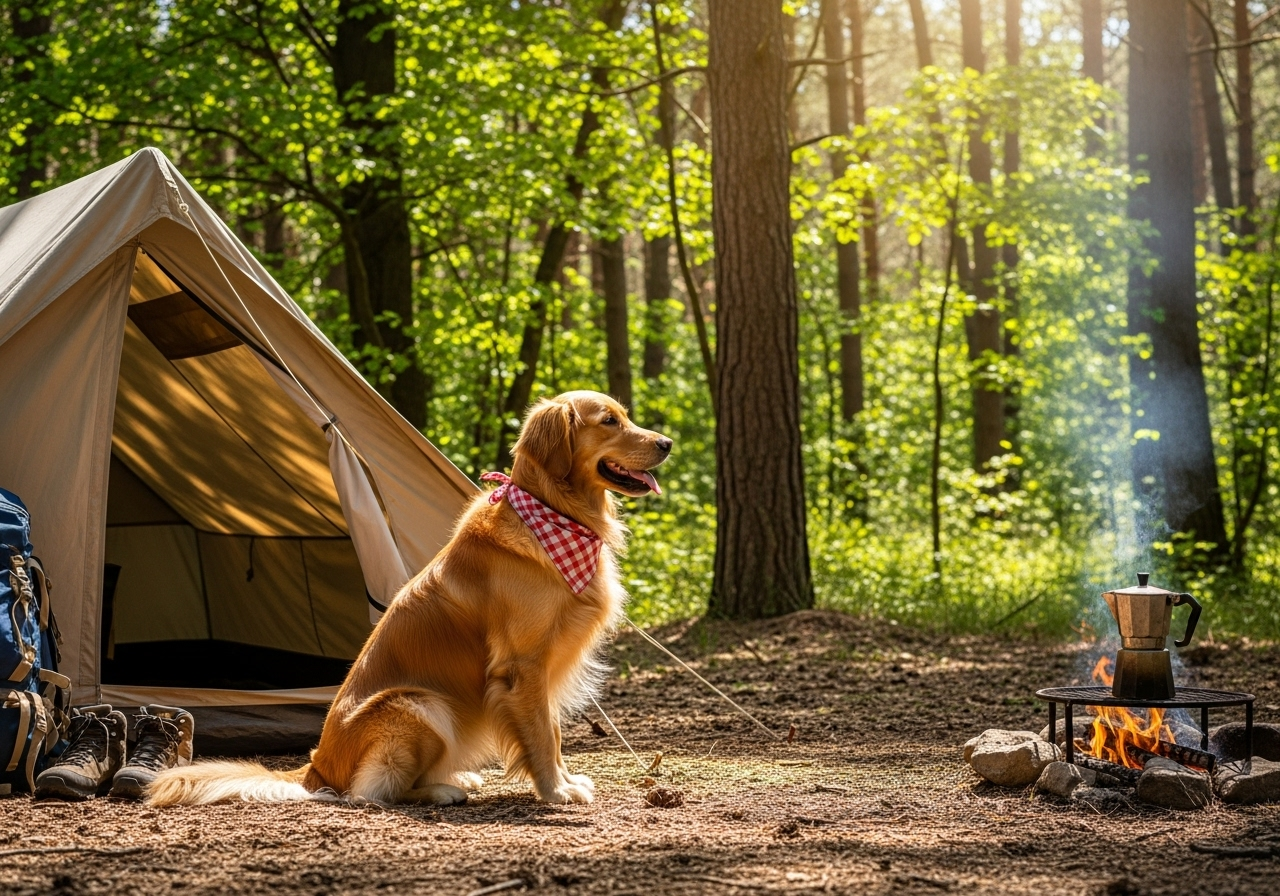
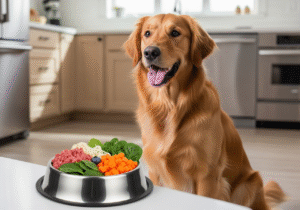


Pingback: 20 Pawsome Dog Photo Ideas to Wow Your Instagram Feed